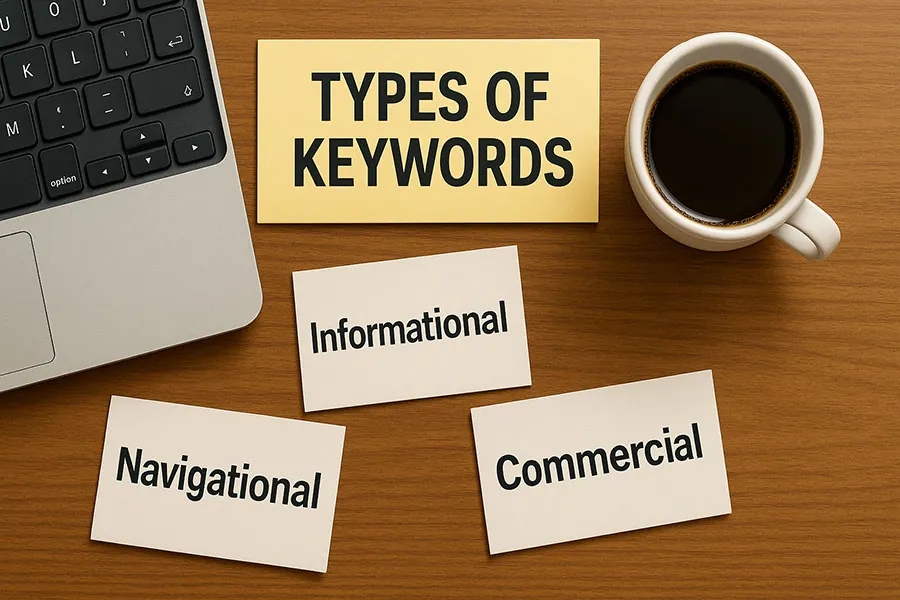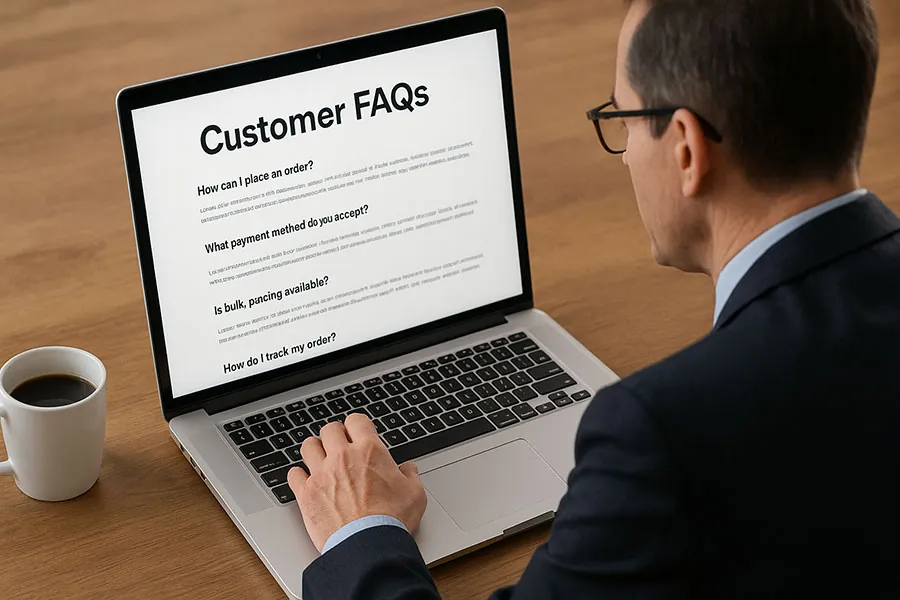Keyword Optimization – Is Your Marketing Agency on Target?


An executive-level guide to checking outsourced SEO work.
Table of Contents
Why leadership still needs to understand keyword optimization
Outsourcing SEO to a marketing agency does not remove your responsibility for results. Every senior manager wants one outcome: a reliable flow of credible RFQs. Search is still the first place prospects look: 71 % of B2B researchers begin with a generic query and they conduct about 12 searches before engaging with a supplier website. If your marketing agency overlooks any stage of that sequence, a competitor collects the enquiry that should have been yours.
This article explains the ten keyword categories that belong in every serious keyword optimization plan so that you can discuss keywords with your marketing company and make sure that they are covering all of the bases that will drive inquiries.
The ten keyword categories and their commercial value
| Category | What they look like | Direct business impact |
|---|---|---|
| Short-tail | One- or two-word phrases with large volumes, e.g. forging | Maintains brand visibility; feeds remarketing lists |
| Long-tail | Three-plus words, very specific, e.g. precision cold forging service | Lower competition; higher enquiry rates per visit |
| Branded + Competitor | Your own name and rival names in organic and paid results | Defends reputation; intercepts comparison shopping |
| Non-branded | Product terms with no brand, e.g. custom stainless bolts | Reaches prospects unfamiliar with you—vital in new markets |
| Buyer-intent | Language that shows purchase intent, e.g. buy ASTM A453 bolts | Links directly to quotation forms or price lists |
| Informational | Questions and how-to searches, e.g. calculate bolt preload | Builds authority; earns links that lift the entire site |
| Navigational | Searches for a specific page or file, e.g. ACME ISO 9001 certificate | Helps customers and auditors locate documentation quickly |
| Transactional | Phrases containing “order”, “MOQ”, “price”, e.g. order wheel studs MOQ 500 | Indicates immediate revenue potential; aligns with enquiry funnels |
| Geo-targeted | Terms with a location, e.g. CNC machining partner in Mexico | Important for logistics advantages and after-sales service |
| LSI / Contextual | Related jargon that deepens subject coverage, e.g. thread rolling near screw manufacturing | Confirms topical depth; stabilises rankings through updates |
How these keyword optimization categories drive inquiries
- Short-tail → Awareness
First touchpoint for prospects who have not yet chosen a supplier. Often replaces part of the trade-show budget at lower cost. - Long-tail, Buyer-intent & Transactional → RFQ volume
Traffic numbers are modest, but conversion rates frequently hit double digits. One confirmed order often covers months of keyword optimization work. - Branded + Competitor → Cost control & share protection
Bidding on your own name keeps click prices low. Covering competitor terms prevents prospects from exiting to alternative suppliers. - Informational → Reduced sales effort
When design engineers arrive informed by your articles, your team spends less time on basic explanations and more time finalising specifications. - Geo-targeted & LSI → Search stability
Location phrases capture enquiries in priority markets, while contextual terms show depth and help the site retain rankings through algorithm changes.
Remember That You Need Content for Keyword Optimization
Great content is the anchor of keyword optimization. Search engines have improved at reading intent, but they still rely on clear structure to decide whether your page deserves a top position. When you provide a concise heading hierarchy, short paragraphs, and data that answers real buyer questions, Google can map each section to a search query. That is how your content becomes a magnet for qualified traffic instead of a warehouse of unused words.


Integrate FAQs for clarity
A focused FAQ section answers objections before they reach your inbox. Place it near the bottom of important pages and build each question around a buyer-intent phrase your marketing agency has flagged. For example, “What is the minimum order for DIN 912 socket screws?” matches a transactional keyword and guides visitors straight to your quotation form. Regularly expand this list with questions from customer emails and distributor calls to keep the language aligned with real search behaviour.
Conclusion – holding your marketing agency to account
Every production line depends on a stable order pipeline. Ensuring that your outsourced marketing agency covers all ten keyword categories is a board-level responsibility. The tables and audit above give you a repeatable way to verify that your keyword optimization investment turns search behaviour into purchase orders.
Need an independent review? Please fill out the information here for a free SEO audit of your website for Taiwan manufacturers to find out how your keywords are really performing.
If you would like to discuss your digital marketing and find out how Taiwan manufacturers can attract more inquiries with the right content and the right website structure, please have a look at some of these other articles in our blog:
Is Your Taichung Website Design Company Doing SEO Optimization Correctly?
Read This Before You Sign a B2B Website Design Contract
B2B Website Content Creation – How to Get Your Digital Marketing Right
